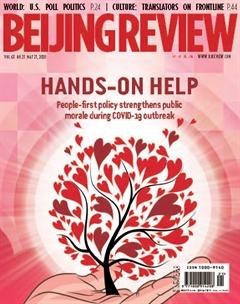The Blame Game
By Jon Taylor

While in the midst of a pandemic and with a crying need for the U.S. and China to unite and work together, it is unfortunate that China-U.S. relations have deteriorated to a level not seen since the Cold War before Richard Nixons historic visit to China in 1972. This deterioration was completely avoidable. One would have hoped that the rhetoric would dissipate as cooler and more rational voices prevailed to restore a greater sense of cooperation in the worlds most important bilateral relationship.
Sadly, rather than pressing to collaborate and enhance a good working relationship with China, during the early part of this year there was a concerted effort on the part of some U.S. offi cials to play down and ignore evidence from China and the rest of Asia that the novel coronavirus disease(COVID-19) was a global threat. Then when the virus fi nally spread to the U.S., there was an effort to lay blame elsewhere and engage in unfounded speculation and Sinophobic scapegoating.
The real danger
The COVID-19 pandemic has been increasingly politicized, which poses a real danger not only to China-U.S. relations but to the world. Rather than seeking consensus, the pandemic is increasingly being used by some U.S. politicians as an excuse to confront China on a variety of political and economic issues that are wholly unrelated.
Unfortunately, a number of politicians from both the major U.S. political parties have continued to work hard in their competition to “one up” each other with the“tough on China” rhetoric—a stance that is, regrettably, seeing an increase in resonance among some Americans.
The most worrying aspect, arguably, is the trend among a group of U.S. politicians to fuel anti-Chinese sentiments by embracing the unsubstantiated and discredited theory that COVID-19 originated in a lab in Wuhan, the city in central China where the outbreak in China was first reported. With a U.S. presidential election looming on the horizon, there is little likelihood of a change in the approach.
Engendering mistrust through mendacity and vendettas is no way for the U.S. to conduct a cogent China policy. Renewed threats of tariffs and other retributions against China may play well among President Donald Trumps base, but emotional outbursts are an ineffective tool for advancing U.S. national interests.
Rather than following through on a pledge to work closely with China, the Trump administration has attempted to obstruct consensus within the Group of Seven and the Group of 20, suspended funds for the World Health Organization, and delayed international cooperation that could both contain and ultimately defeat COVID-19. Despite this hostility, scientists in both the U.S. and China are managing to work together, which I will take as a positive sign for the future.
In a more genteel time, the fi ght against the COVID-19 pandemic would not be seen as an opportunity to prove American exceptionalism or refute aspects of ideological systems. However, we are not in a genteel time within U.S. politics. Rather than seeing the pandemic as a moment for coordinating resources and ideas between China and the U.S., we are instead witnessing heightened Sinophobic rhetoric on behalf of Trumps reelection bid.
Trumps political advisers have created a narrative that its all Chinas fault. By defl ecting blame and criticism away from the U.S. and its slow response to the pandemic, this narrative has encouraged Trump and his supporters to take a much more aggressive approach toward China because they believe it will help them politically.
Disappointingly, some recent opinion polls bear this out. A recent Republican National Committee poll showed that 51 percent of voters in 17 swing states including Ohio, Michigan, Pennsylvania and Wisconsin blamed China the most for the COVID-19 outbreak, while only 24 percent blamed Trump. Trumps reelection message thus becomes clear: Blame China because its responsible for creating the COVID-19 pandemic, stealing millions of U.S. jobs and damaging the U.S. economy. It is an existential threat to the U.S.
The China card
Presenting a “strong” leadership vis-à-vis China has political benefi ts during a presidential election year. Trump and presumptive Democrat nominee Joe Biden are conveniently blaming each other over China in the name of partisan politics. Outdoing each other on China is bad for China-U.S. relations, can and has stoked antiChinese racism, and is mistakenly taking a Cold War-like path.
Following Trumps lead, campaign consultants for the Republicans in the Senate recently circulated a 57-page memo that instructed their candidates to attack China and to attack the Democrats for being “soft”on China. The memo bluntly stated that“China caused this pandemic by covering it up, lying, and hoarding the worlds supply of medical equipment.”

U.S. Secretary of State Michael Pompeo has repeatedly and aggressively criticized China, blaming it for the deaths of hundreds of thousands of people from the coronavirus, and intimating that it deliberately released the virus and intentionally concealed the severity of the virus.
For instance, in early May, he said though“we dont have certainty,” “there is significant evidence” that the virus came from a laboratory in Wuhan.
During a recent Fox News virtual town hall, Trump suggested that Chinas leaders deliberately allowed global travel so China would not suffer alone from the virus. He also claimed that Chinas handling of the pandemic is proof that it “will do anything they can” to make him lose his reelection bid in November.
Consider the mental gymnastics that went into this claim. Chinas entire chain of command within both the Communist Party of China (CPC) and the government somehow decided that it would be a great idea to expose its own people to a deadly virus, hoping that it would somehow eventually make its way to the U.S. and infect enough of the U.S. population so that they would then not reelect Trump!
At what point does it fi nally become unreasonable to scapegoat China for the policy failures of the U.S., irrespective of how the virus originated? By January 24, almost entire Hubei, the province where Wuhan is located, had been quarantined. On January 25, the Standing Committee of the Political Bureau of the CPC Central Committee discussed the accelerating spread of the coronavirus and President Xi Jinping was publicly quoted as saying that it was a grave situation.
Ineffective response
Does this sound like a cover-up that caught the U.S. off-guard? No. Yet certain U.S. offi cials repeatedly claim that China refused to cooperate or give information. Complaining about China and punishing it does nothing to fix an ineffective U.S. response. The real tragedy is that the U.S. was either unable or unwilling to look at the extraordinary evidence—the Chinese national lockdown—and draw even the most obvious conclusion from this. The result was a deplorable lack of preparedness.
China is not the enemy of the U.S. The virus is the enemy. It would behoove the U.S., China-U.S. relations and the world if ego and nationalism were put aside in order to focus on the goal of defeating the novel coronavirus. Perhaps then the damage that has been done to China-U.S. relations would reverse course and begin to improve.

